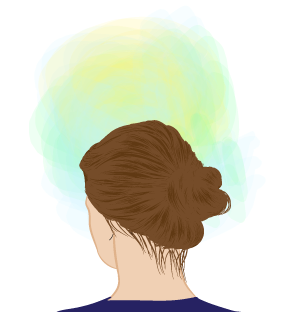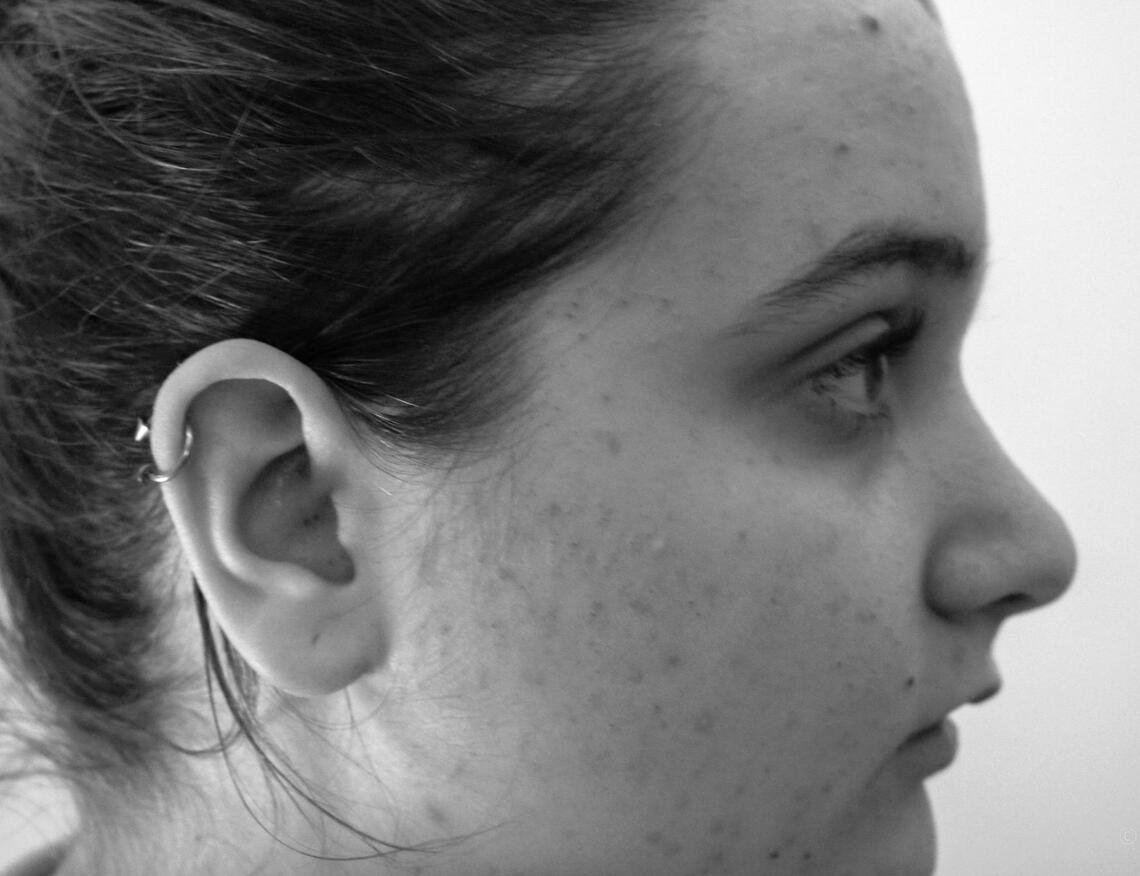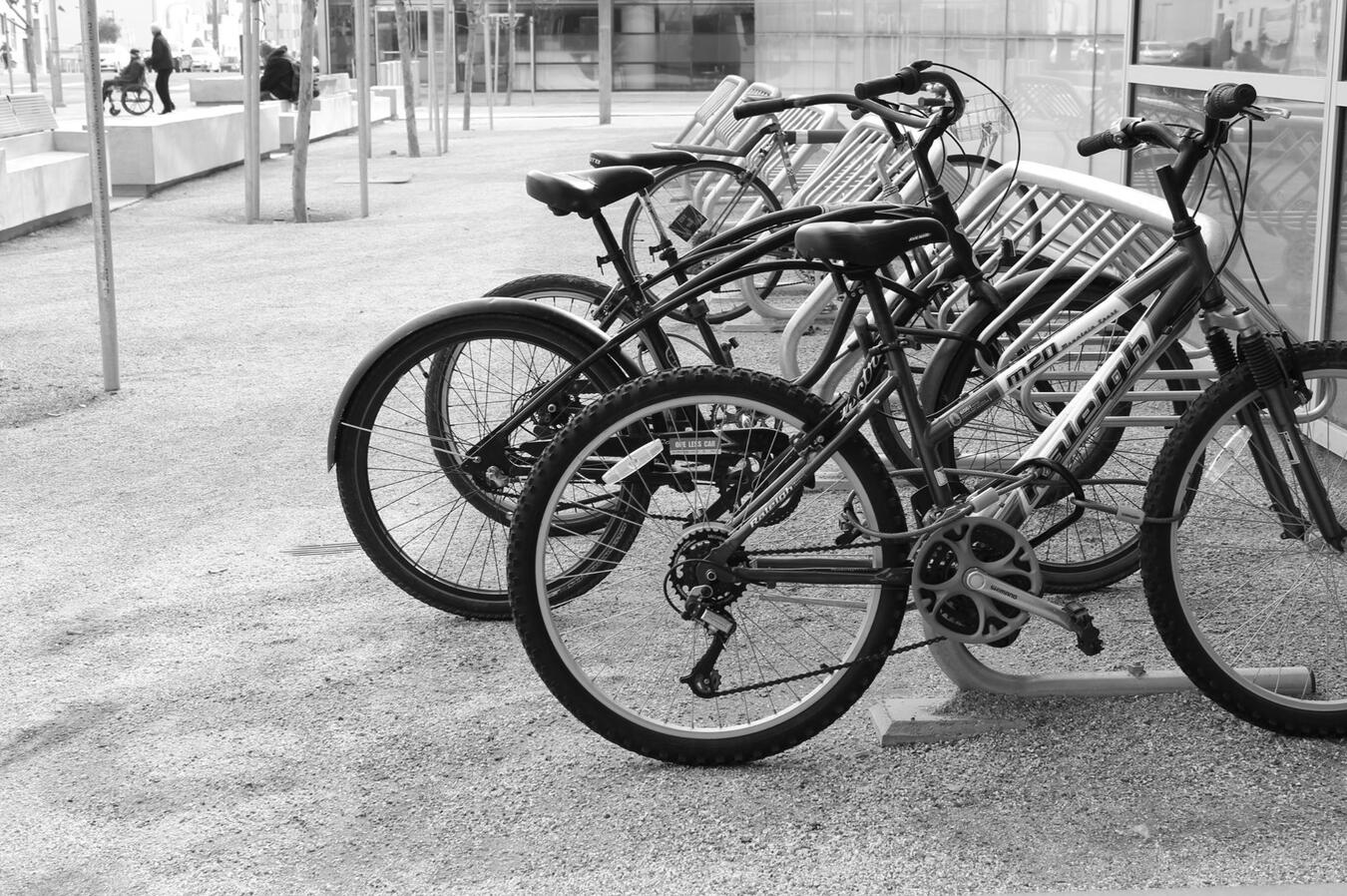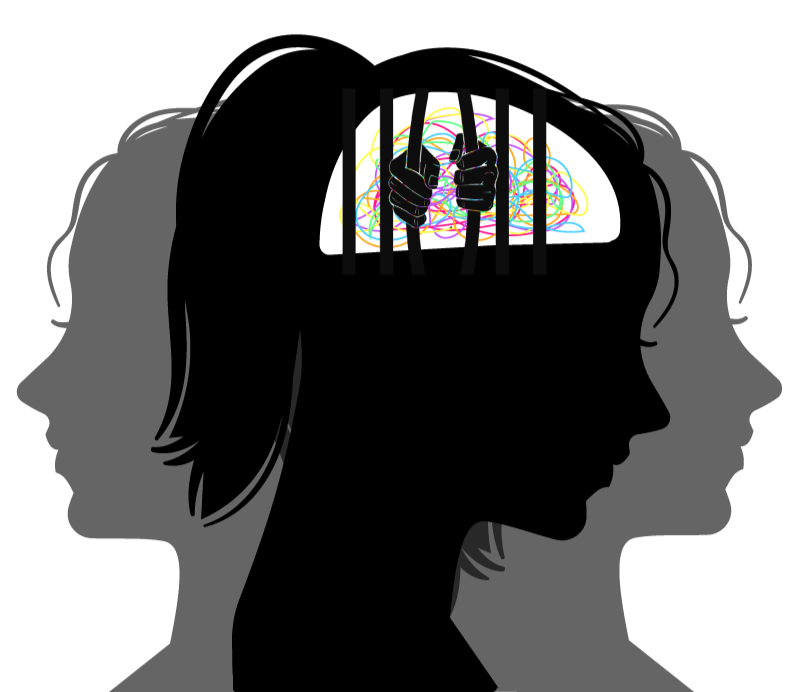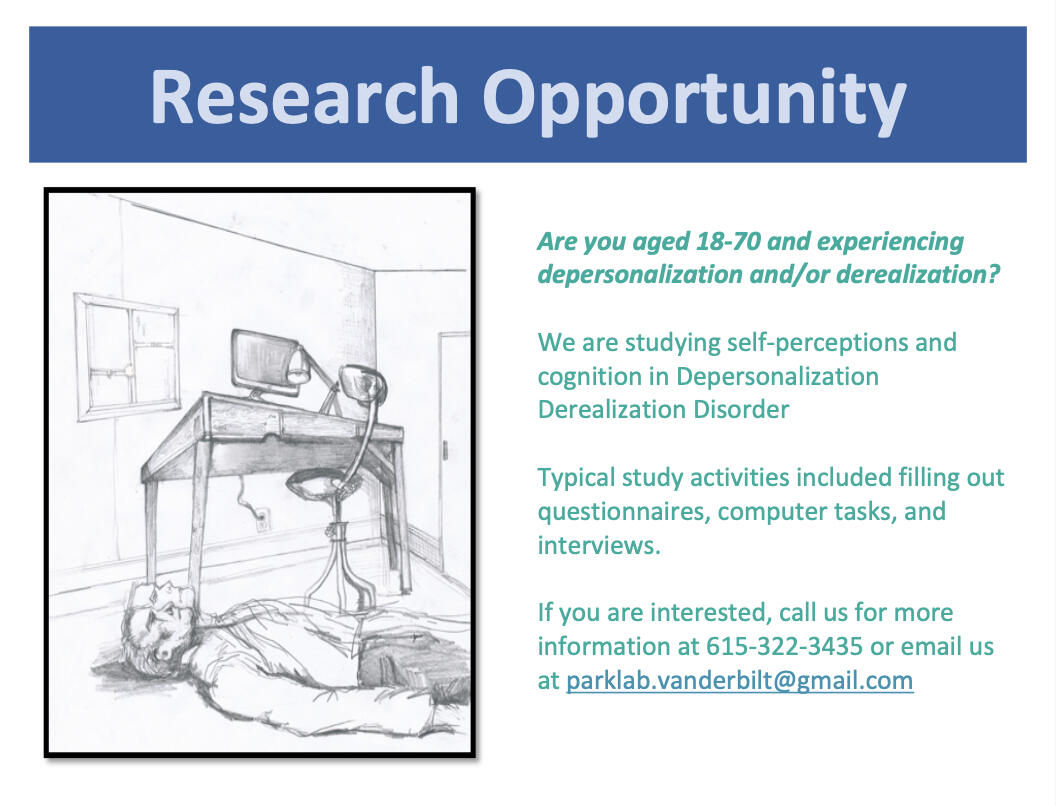Depersonalization Derealization Disorder Awareness
Welcome to the DPDR Disorder Awareness website. I hope this website can help you learn about this disorder and maybe even help you feel less alone.Please remember this website is not a substitute for getting medical assistance. If you believe you have this disorder please try to seek professional help if it's available to you.Comments? Questions? Concerns?
[email protected]
Our Stories
Lauren's Story
Hi, my name is Lauren. I'm the creator of this website and also someone who has had DPDR Disorder since 2014.Dissociation has been a coping mechanism of mine since I was a child. I think that's a huge reason why, when I experienced significant trauma in 2014, I slowly started to develop Depersonalization Derealization Disorder.When the symptoms started, I had no idea what was going on. I thought maybe my medication was making me feel a bit foggy and disconnected, so I spent a long time switching medications and doses. Nothing was working or changing my level of fogginess. In fact, it was getting worse. I didn't understand what was going on. I thought I was slowly losing my mind.I heard someone online talk about depersonalization and derealization, and everything clicked. By this time, it was about 2018/2019. I had been slowly getting trapped inside my own mind for 5 years. Things just seemed flat. I was having trouble creating friendships or relationships because I couldn't physically feel any of the love those people were giving me. It's not that I don't have feelings. I know when I'm happy, sad, or mad, but I don't connect with those emotions. I don't feel them in my body, even though subconsciously my brain does feel them. I started to eventually just feel like a shell of a human.In 2020, I finally got my official diagnosis of Depersonalization Derealization Disorder. It felt really good knowing I wasn't losing my mind and knowing it's actually something a lot of people heal from.Sadly, I haven't had many moments since 2014 where I wasn't dissociated in some way. I had a couple of months where I felt really, really good back in 2021, but that quickly faded. I made a video during that time. I was super hopeful that the extreme dissociation wouldn't come back, but it sadly did.
Sometimes, I get moments of feeling grounded. I have glimpses of what it feels like to be inside my body. I know it's possible to heal from DPDR Disorder, and someday my brain will know it's safe to let me be present.Right now, I spend a lot of my time making content online and trying to distract myself from thinking about how foggy I feel. Since DPDR Disorder is so under-researched, it's been hard to find a successful treatment plan. Currently, I'm working with a therapist, and I feel hopeful that even if I do have to live another decade with this disorder, it's not going to ruin me. I'm going to survive, and DPDR Disorder will not ruin my life.If you'd like to follow me online:
Twitter/X: @laurenkrisdude
Rei's Story
Hiya, my name is Rei.I first experienced DPDR during school when I was suffering from severe anxiety. At the time, I had no idea that DPDR or dissociation even existed, so I thought I was losing my mind. I was living in a foggy dream, questioning multiple times a day when I'd wake up.It went away after that during the summer, and I forgot about it completely until I started college, where it returned. It wasn't until then that I began to do some research and discovered DPDR.I had this disorder for 4 years, and now I am happily recovered. What I found is that rumination and consistent dwelling on the feelings and experiences caused by this disorder make it 100% worse.My advice: live your best life. Life is short, so go out there and do things. Don't think about this disorder, don't even look at it. Just keep moving forward, and you'll eventually find that peace.
Y8t's Story
I experienced DPDR around 7 months ago in the summer of 2022. My DPDR was drug-induced, involving the use of marijuana. In the beginning of July, I was hitting a cart to the point of greening out. The day after, I noticed that my high had manifested into some sort of weird dream-like state where I couldn’t recognize my body and face. I also had a sense of the world being fake due to how unusual it looked and felt. In fact, when I woke up from sleeping the day after greening out, I genuinely thought I was still in a dream because of how fake everything felt. I pinched my arms and touched my face to realize that whatever this is, it's not a dream.The days following were really anxious. I could only manage to sleep for 4 hours, feeling like I was going to disappear from the world or that I would leave my body and die. I felt terrible. One thing I gained from this, though, was a promise to myself that I was never going to take drugs ever again, and currently, I still hold true to that promise.The first few months were hard. After a few weeks of maintaining this feeling of dissociation, I chronically googled and researched what was wrong with me. Luckily, I found out that I had DPDR. I feel fortunate in a way for finding out I had DPDR (and eventually getting it confirmed by doctors) because I was able to cope with it more quickly than others who didn’t find out until years later. But the first few months sucked nonetheless. I gained various phobias, experienced panic attacks, and overthought about having schizophrenia or brain damage of sorts. My anxiety was through the roof.I do remember at some point around this time, I got medication for anxiety, but it sucked, and I absolutely hated it.Skipping to around December 2023, I felt relatively better than I did before. Feelings of unreality weren’t as bad, yet they plateaued after a month or two recovery-wise. I felt relatively less anxious, wouldn’t overthink as much. I still had phobias of sugary and caffeinated food, but I guess that’s kind of normal considering they do make DPDR worse. The only thing I would consider that’s getting worse is my visual snow; I'm currently going to doctors for that as of now. That's been tough recently. I wasn’t doing too bad, but I still felt as if I were in a bad place in life.A week or two before New Year's, I wanted to bring forth change in my life. I've already been off weed and any kind of drugs for 6 months, so I already had a well-off start. I also started changing my sleep schedule, gaining healthy habits, working harder overall, and going to the doctors to take my DPDR seriously. I was tired of living the same dull life of dissociation, so I decided to change.It’s currently January 20th, 2024, and I would say I’m recovering. Not fully recovered as of now, but I’m hopeful. I'm not really good at giving advice, but as some guy said, 'You can’t feel one feeling forever; that’s literally impossible.' Yeah, there's my advice, bam.
About DPDR Disorder

What is Depersonalization Derealization Disorder?
Depersonalization Derealization Disorder is also known as Depersonalization Disorder and can be found be abbreviated as DPDR, DPD, DDD, DD, DRD, and more. It is a Dissociative Disorder that is found in 1% to 2% of people. To put it simply DPDR Disorder is the disconnection between yourself and your environment. The symptoms of depersonalization and derealization are actually experienced by over 50% of people in their lifetime, but the severity of the symptoms are what contribute to a diagnosis. Having these symptoms does not necessarily mean you have DPDR Disorder, but instead could be pointing to another mental or physical illness, so please see a professional to get tested.The DSM-5 diagnostic criteria goes as follows -
-Must experience depersonalization and/or derealization
-Onset must not be contributed to any other disorder or outside agency
-Patient must have a sense of reality and know their unreal experiences are not actually real
-The disorder must cause significant distress and/or social or occupational impairmentThere are a few ways I can describe what it feels like to have DPDR Disorder. To put it as simply as possible, it’s almost like smoking weed and getting all the effects minus the high (we will discuss drug induced DPDR on this page). A more detailed way of putting it is it feels like I’m trapped behind a glass wall. I have all these experiences and emotions and relationships being thrown at this wall and I can see them, I know they are there, but I can’t touch them. I can’t connect to them.
What causes DPDR Disorder?
Studies have shown that the main cause of Depersonalization Derealization Disorder is trauma.
DPDR Disorder is very under-researched, so there isn't much information about the brain chemistry of someone with DPDR Disorder. It's inconclusive if dissociation disorders are genetic. In my opinion, I believe genetics have a role in some people developing this disorder considering my own family history and other studies I have read.There have also been a lot of people who have had drug induced episodes of DPDR Disorder. Usually this is when smoking weed. The theory is that if your brain is susceptible to DPDR Disorder that smoking marijuana can trigger this disorder in you. I haven't personally read any studies done on this, but I have read about a lot of people who experience depersonalization and derealization due to smoking weed (although they may not qualify for a diagnosis for the disorder itself).
What are the symptoms?
Here are some but not all of the symptoms of DPDR Disorder. You do not have to experience all of these to have the disorder, and you also don't necessarily have the disorder if you experience some of these, so please see a doctor if you can.-Feeling like you are outside of your own body
-Feeling emotionally or physically numb
-Not knowing if your memories are your own or not knowing if your memories are real
-Having trouble with your memory in general (dissociative amnesia)
-Feeling like you are in a dream or movie
-Feeling emotionally separated from people you care about or the things you love
-Distortions in time
-Object and distance distortion
-Feeling foggy
-Feeling like your head is full of cotton
-Not being able to gather your thoughts
-Feeling like a robot
-Things may look 2D
-Tunnel vision
-Lethargy and/or fatigue
How to get diagnosed
A proper diagnosis can be made by doing a physical with your primary care doctor to rule out any neurological issue that may be the reason you are experiencing these symptoms, and also taking a psychiatric evaluation with a licensed psychologist.The psych evaluation I took happened over two sessions and tested me for most mental illnesses.
How do you get treatment?
Lucky for you, DPDR Disorder has been known to be curable. Sadly, since it lacks so much research it can be hard to find a treatment plan that fits you.Right now, therapy is the main treatment. I highly suggest looking up therapists in your area who work with trauma and/or dissociation disorders.There is no known medication to cure this disorder. People with this disorder often use antidepressants and/or anti-anxiety medication to help with how mentally draining and debilitating this disorder can be. The reason for taking anti-depressants is to alleviate mental stress which in turn alleviates dissociation (which includes DPDR).The biggest piece of advice I can give you is to find a positive distraction. The more you dwell on the fogginess you are feeling and how unconnected you are from everything, the more in your head you will be and the dissociation will just get worse. So while you are trying to heal from this disorder I highly suggest finding something that you can occupy your mind with sometimes. While distraction won't always be helpful, it does help every now and then. Distraction is a good way to ground yourself, but can also become a bad habit, so try not to become addicted to using things like your phone, social media, etc. as a distraction. It's still so important to work on the disorder rather than distract yourself 24/7.It is so great you want to learn more about the disorder you have, but try not to let it consume you. I am not the kind of person who will tell you that DPDR Disorder is not who you are. I think it's really hard to not make something that affects every second of your life a part of you. Just don't let it be all of you. I believe you are capable of living a beautiful life while getting treatment for this disorder. I believe in you.
DPDR Disorder Deep Dive
I made a video deep diving a bit into this disorder, so if you'd like to hear more please check out the video below.
Citations
- https://bmcpsychiatry.biomedcentral.com/articles/10.1186/s12888-016-0908-4
- https://www.mayoclinic.org/diseases-conditions/depersonalization-derealization-disorder/symptoms-causes/syc-20352911
- https://www.webmd.com/mental-health/mental-derealization-overview
- https://nchmd.org/health-library/diseases-and-conditions/con-20306119/
Submit Your Story
I'm collecting people's stories to post on the website eventually. I would love to include yours! Feel free to email a photo (optional) and your DPDR Disorder story to [email protected]If you are a parent, loved one, or friend of someone who has DPDR Disorder and you'd like to share your perspective of knowing someone with the disorder you can also submit your story!Email:
[email protected]
Contact
If you have any questions, comments, or concerns please contact the email address below.Please note this email address is not a helpline and if you feel like you are a danger to yourself or others please contact emergency services.Email:
[email protected]
Educational Videos
Here are some educational videos about DPDR Disorder
DPDR Studies
Participate in a Vanderbilt University Research Study!Title: Altered Self-Perceptions and Cognition in Depersonalization-Derealization Disorder and Psychosis-Spectrum DisordersDescription: We are exploring altered self-perceptions and cognition in depersonalization disorder. The online study (open to anyone in the US) includes a clinical interview; 11 self-assessments focused on depersonalization, trauma history, perceptions of self, social relations, and psychosis-proneness; and a semi-structured interview focused on experiences of depersonalization.If you are in the Nashville area, you may also participate in our in-person study visit, which could include additional cognitive testing, virtual reality, and an MRI scan, depending on your preference.Please fill out this brief study screening: https://redcap.vanderbilt.edu/surveys/?s=YMPPY8L9RMN7F84H or give us a call at 615-322-3435.
